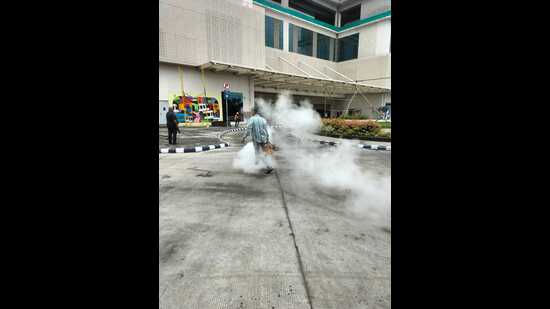Pune recorded highest-ever caseload of vector-borne diseases in 2024
The Pune Municipal Corporation (PMC) only recorded as confirmed dengue cases people who tested positive via the IgM ELISA and NS1-ELISA tests
Pune city recorded its highest-ever caseload of vector-borne diseases in 2024; with 382 cases of dengue, 485 cases of chikungunya, 109 cases of Zika virus, and 21 cases of malaria. Despite multiple efforts undertaken to contain the Zika virus, the city reported 109 cases of the same. The Pune Municipal Corporation (PMC) only recorded as confirmed dengue cases people who tested positive via the IgM ELISA and NS1-ELISA tests. Patients who tested positive as per the non-ELISA NS1 antigen test were considered as suspected cases of dengue.

At 485, Pune city recorded the highest number of chikungunya cases in 2024 as compared to the previous three years. There was an increase in the number of dengue cases too in 2024 as compared to the previous year. According to private doctors, several chikungunya patients who tested positive last year reported experiencing severe symptoms. Most of the patients with severe chikungunya reported severe complications such as chikungunya with encephalitis, meningoencephalitis, myocarditis, gastroenteritis, kidney injury, sepsis and Guilain-Barré syndrome, they said.
Dr Dileep Mane, managing director and chairman, Noble Hospitals and Research Centre, said, “The surge in chikungunya was significant in 2024 and peaked in August and September. We saw diverse presentations ranging from the routine high-grade fever, multi-joint pain and swelling to the unusual neurological involvement called chikungunya encephalitis requiring intensive care. A double whammy of high numbers coupled with unusual clinical presentations was observed after many decades, in 2024. The neurological manifestation was predominantly in the form of symptoms such as irrelevant talking due to altered sensorium, muscle weakness, neuropathy or GB syndrome.”
Dr Santosh Sontakke, consultant neuro-physician at Ruby Hall Clinic, said, “Nearly 50 to 60% of the patients who reported recovering from chikungunya are still complaining of joint pain and neuropathic pain. This includes tingling, numbness, shooting pain, and other sensory disturbances that can linger for an extended period, severely impacting their quality of life.”
Dr Sontakke said, “The strain in 2024 seems to have a more prolonged course and wider multisystem effects, particularly on neurological functions. Most patients require long-term management of their symptoms with immunomodulators or other supportive treatments to mitigate their discomfort and improve their quality of life. This persistence especially underscores the reasonableness of concern regarding the long-term complications possible in chikungunya and how differential diagnosis and care could significantly make a difference in managing after-effects.”
Professor Dr Sachin Shivnitwar, department of medicine, DPU Super Specialty Hospital, said, “We witnessed there is a recurrent epidemic of dengue every year in Pune and in the country. The reason for such an epidemic is climate change, where mosquitoes get fertile ground for breeding in stagnant waters during the rainy season. In summer, the change in temperature and humidity favours virus transmission.”
Dr Shivnitwar said, “Dengue and chikungunya fever are known to cause complications such as encephalitis, meningoencephalitis, myocarditis and Guillain-Barré syndrome. The likely reasons behind this include genetic predisposition and the significant role of immunity. Similarly, patients with other risk factors, such as diabetes, heart conditions or cancer are more likely to develop severe illness if they contract infections like dengue or chikungunya.”
Dr Rajesh Dighe, assistant health officer and head of the vector-borne diseases’ control programme, said, “The torrential and erratic rainfall last year is a significant reason behind the sharp spike in vector-borne disease cases providing favourable breeding conditions. The civic body has been able to control the situation by eliminating outdoor breeding spots but mosquitoes breeding indoors was a prime challenge. However, despite the large number of cases, not a single death due to vector-borne diseases was reported in the city.”
Dr Dighe informed that from last year, the PMC began containment activities in areas that reported NS-1 positive cases of dengue that are considered suspected cases. “The reason behind the large number of cases is that there was no under-reporting and the civic body tested a massive number of patients suspected to have the infection,” he added.






